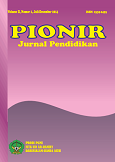BUILDING BASIC SCIENCE CONCEPTS THROUGH SIMPLE EXPERIMENTS AT AISYIYAH BUSTANUL ATHFAL 2 KINDERGARTEN
DOI:
https://doi.org/10.22373/pjp.v14i1.28507Keywords:
PendidikanAbstract
Introduction of basic science concepts to early childhood is very important to stimulate curiosity, develop critical thinking skills, and build an initial understanding of natural phenomena. This article aims to explore the use of simple experimental methods as a means to build basic science concepts in Aisyiyah Bustanul Athfal 2 Kindergarten. The study used a descriptive qualitative approach with data collection techniques through observation, interviews, and documentation of experimental activities, such as mixing colors and observing the properties of objects. The results showed that simple experiments that were designed in a safe, interesting, and easy-to-understand way were able to increase children's engagement, strengthen their understanding of basic science concepts, and encourage questioning and experimenting activities. In conclusion, simple experiments are an effective learning strategy in supporting the cognitive development and curiosity of early childhood. These findings can be adapted by other PAUD educators by adjusting the context and characteristics of children in each learning environment. In addition, this approach is relevant to the principles of active and constructivist learning in early childhood education, so that it can enrich pedagogical practices at the national and global levels. Keyword: Simple Experiments, Basic Concepts of Science, Early Childhood Education, Aisyiyah Bustanul Athfal Kindergarten, Play-Based LearningReferences
Ani, Mulyani. (2024). 1. Eksperimen Pencampuran Warna Dalam Meningkatkan Keterampilan Sains Pada Anak Usia Dini. Jurnal Pendidikan, Sains dan Teknologi, doi: 10.47233/jpst.v3i3.2000
Asih, Wikaningtyas., Muhammad, Nasir. (2024). 2. Pendekatan saintifik dalam pengembangan Kurikulum 2013 PAUD. Jurnal warna, doi: 10.24903/jw.v9i1.1476
Cahyo, A. N., Manullang, T. A. A., & Isnan, M. (2020). Analisis penggunaan gaya bahasa sarkasme pada lagu Bahaya Komunis karangan Jason Ranti. Asas: Jurnal Sastra, 9(1), 6-22.
Estin, Nofiyanti., Noer, Laelly, Btag., Nandhini, Huda, A., Gatut, Ari, Wardani. (2022). 4. Edukasi Mengenai Peranan Reaksi Kimia dalam Tubuh Bagi Anak Usia Dini di Kober Al-Mujahidin. Jurnal Pengabdian Pada Masyarakat, doi: 10.30653/002.202273.137
Helda, Fibriyanti. (2020). 2. Early Childhood Protection Efforts in Using Science-Based Learning Media. doi: 10.2991/ASSEHR.K.201204.035
Ismawaty, Q. (2024). Metode Eksperimen Dalam Meningkatkan Literasi Sains Anak Usia Dini. Jurnal Adzkiya, 8(2), 20-27.
Karunia, Puji, Hastuti., Deasy, Arisanty., Sunarno, Basuki., Dharmono, Dharmono., Ali, Rachman. (2024). 1. Developing Students’ Critical Thinking Skills Through Differentiated Problem-Based Learning. Pedagogika, doi: 10.15823/p.2024.155.9
Kasmiati, Kasmiati. (2024). 1. Science Learning for Early Childhood Students with Science Games Play. Jurnal Penelitian Pendidikan IPA (JPPIPA), doi: 10.29303/jppipa.v10i8.8330
Kazuki, Niwayama., Yosuke, Maeda., Yumi, Kaneyama., Hiroshi, Sato. (2020). 3. Increasing teachers’ behavior-specific praise using self-monitoring and a peer teacher’s feedback: the effect on children’s academic engagement. Preventing School Failure, doi: 10.1080/1045988X.2020.1749978
Liana, S. (2024). Studi Tentang Kesulitan Fokus Anak dalam Pembelajaran: Tinjauan Psikologis dan Edukatif. PIJAR: Jurnal Pendidikan dan Pengajaran, 3(1), 26-33.
Liliana, Daniela, Silva-Núñez., Maritza, Librada, Cáceres-Mesa. (2024). 1. Experimentation as a strategy for approaching scientific knowledge. Revista Metropolitana de Ciencias Aplicadas, doi: 10.62452/yx1rwz28
Miryam, Bar-Matthews. (2022). 2. Development of Achievement Emotions. doi: 10.1093/oxfordhb/9780198855903.013.36
Nelya, Mikhailovna, Rodina. (2022). 4. Peculiarity of the implementation of child experimentation in the cognitive development of preschoolers in different age periods. KANT, doi: 10.24923/2222-243x.2022-43.57
Rosa, Imani, Khan. (2020). 3. Developing and learning how to optimize early childhood activity through playing.
S., Edessa. (2020). 1. Creative education for the improvisation of experimental teaching materials for training qualified biology teachers.
Salsabila, Hasiana, Tanjung., Dorlince, Simatupang., A, M, Diputera., Kamtini, Kamtini. (2023). 3. Early Scientific Thinking : Basic Stimulation in Early Childhood Cognitive Development. doi: 10.4108/eai.24-11-2022.2332530
Downloads
Published
Issue
Section
License
- Authors retain copyright and grant the journal right of first publication with the work simultaneously licensed under a Creative Commons Attribution License that allows others to share the work with an acknowledgment of the work's authorship and initial publication in this journal.
- Authors are able to enter into separate, additional contractual arrangements for the non-exclusive distribution of the journal's published version of the work (e.g., post it to an institutional repository or publish it in a book), with an acknowledgment of its initial publication in this journal.
- Authors are permitted and encouraged to post their work online (e.g., in institutional repositories or on their website) prior to and during the submission process, as it can lead to productive exchanges, as well as earlier and greater citation of published work (See The Effect of Open Access).

